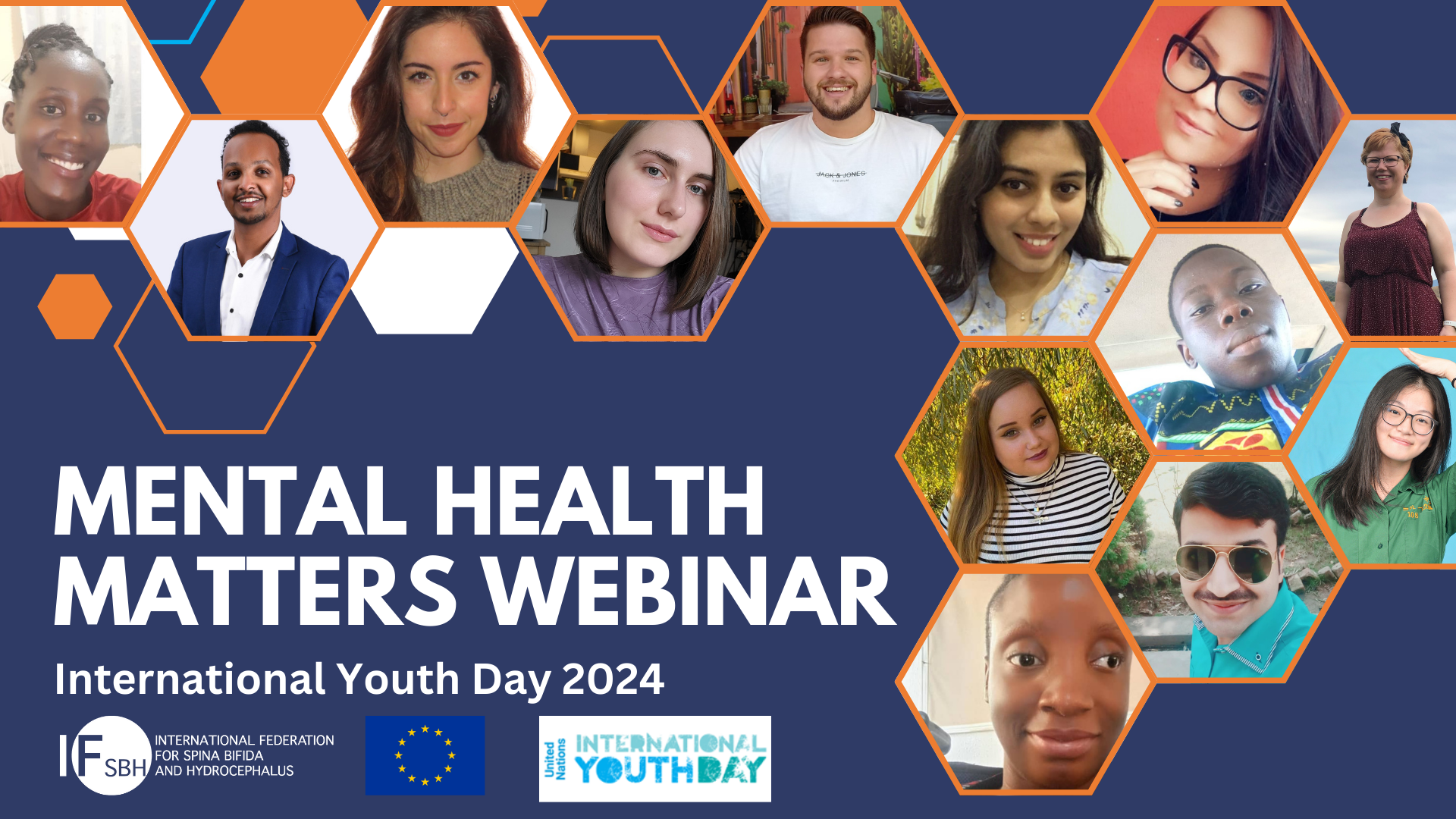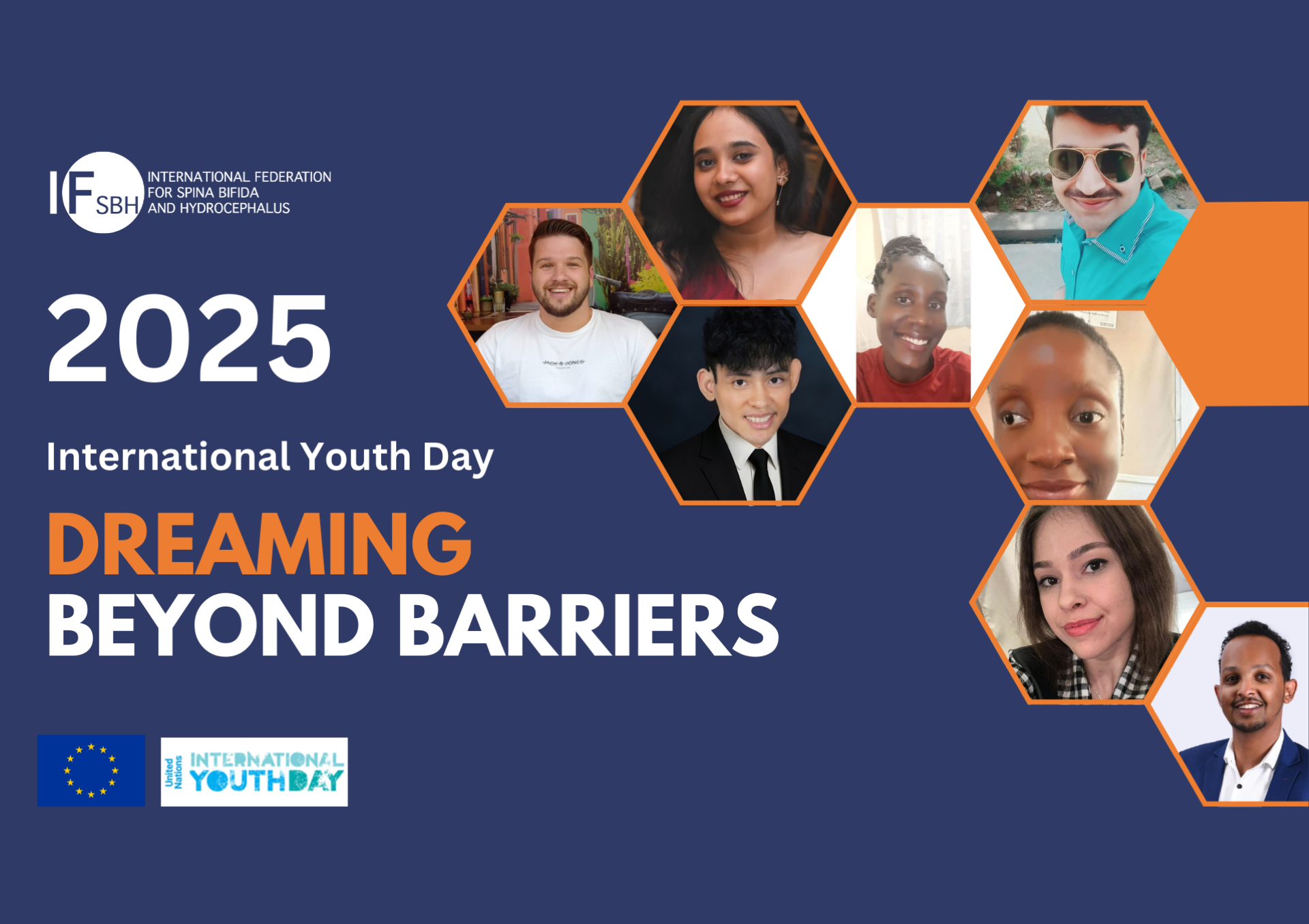International Youth Day 2024: Mental Health Matters!
On August 12 the IF International Youth Group SBH celebrated the UN recognised International Youth Day. For this year, youth started with a social media campaign and extended an invitation to all young people with SBH around the globe to amplify the voices of the youth. Particularly, the group launched a social media campaign and aimed to raise awareness on one of current youth issues around the world: Mental Health Matters.
To equip the community for this campaign, the IF International Youth Group SBH shared the IF International Youth Day toolkit with insights and ideas to elevate participation. For instance, youth around the world shared unique perspectives on what mental health, in particular self-acceptance, means to them.

A particular highlight was the zoom webinar dedicated to Mental Health Matters organised by and for youth with Spina Bifida and Hydrocephalus around the world.
The webinar gathered representation and attendance from various members from different countries. The webinar facilitated meaningful exchanges among youth with SBH on the topic of mental health. A keynote speaker was invited to provide his expertise on mental health, allowing the attendees to hear from the medical perspective advancements and guidance on mental health targeted specifically to the youth. As well as youth speakers highlighting ways on improving self-acceptance.

From the expert on mental health, Prof. Dr. Alexander von Gontard, started by introducing the term “emerging adulthood” that comprises young adults between 18-30 years old, and shared with the audience a definition of mental health from the medical perspective, and further developed on concepts such as “coping” and “mechanisms of coping”; “mindfulness”; “mental health disorders”, and “mental health in persons with Spina Bifida.” He also presented the audience with the latest medical advances regarding assessment and treatment of mental health disorders. Additionally, Dr. von Gontard, participated in the panel and Q&A and took questions from the audience on various topics related to mental health, providing insight and an expert perspective that was valuable to the attendees.
From the IF Youth Group SBH, all the speakers shared their experiences in dealing with mental health and overcoming challenges and learning from those experiences by strengthening their resilience capacity and relying on important people in their lives such as friends, family and others through their extended social networks.
Laura Rossilo Beneyto, from Spain explained the IF Youth SBH Group decided to narrow down a broad topic of mental health by identifying subtopics that were a part of a small survey posted on social media to the youth living with SBH from various locations in the world that contributed with their own opinion. The subtopics included 1) Intergenerational learning 2) Disability acceptance 3) Family Support 4) Empathy and Bullying at School 5) Mental Support within the Public Healthcare Systems, and 6) Personal Relationships, Sexuality, and Family Planning. Laura explained that Disability Acceptance was the topic that collected the majority of the votes and that resulted in the topic selected for the webinar. She highlighted that there is a multidimensional aspect to acceptance that involves accepting disability on a personal level but also making society accept disability. She emphasised that the ultimate goal is to push further for disability acceptance. She additionally highlighted the international celebration of Youth Day 2024 and referred to why mental health is key for youth living with SBH.

Nebiyat Tesfaye, from Ethiopia, gave a personal testimony on his life and the support he received from his family which enabled him to attend medical school and become a neurosurgeon and the efforts he had committed to advocate for the rights of persons with SBH in his own country.
Additionally, the webinar promoted interactive participation of the attendees by incorporating in the agenda the Wooclap online activity that allowed for collecting opinions to show them simultaneously on screen, thus facilitating and amplifying exchanges.
Jurn Anthonis, from Belgium, concentrated in describing ways he has identified throughout his life and work in order to improve self-acceptance. He studied Applied Psychology and Grief and Loss Counselling. In his presentation, he emphasised that self-acceptance is something unique and it implies a personal experience. He discussed living with Spina Bifida and how to keep a positive attitude in overcoming challenges and to keep the focus on the positive things. For this event dedicated to mental health, he drew from his experiences working with youth in the Youth Camps in Belgium, which he gave as an example of a place that enables learning skills to become more independent, and where a safe space is available to share experiences, gain a sense of community and find support. He emphasised the importance of surrounding yourself with people that provide support. He also discussed how making contributions to society, and keeping a good sense of humour is important for the spirit and for self-acceptance.
Ajok Proskovia, a member of the IF Youth Group SBH from Uganda, elaborated on the topic of Advocacy. She shared and highlighted various ways on how to get involved and promote and raise awareness on the rights of persons with SBH, particularly youth, as it means to participate and influence in the development of policy agendas. She mentioned the importance of the Youth accessing ways to develop mentorship, negotiation, and leadership skills. She further developed in the areas where youth can make a contribution such as health, education, workplaces, transportation and others. She encouraged webinar participants to look for peer to peer support as means of exchanging experiences and obtaining support. Additionally, she invited the audience to get engaged in efforts to be heard as to what youth wants to see, discuss progress towards advancing discrimination, leaving behind stigma and how this is ultimately a boost for mental health. She encouraged the youth to organise an advocacy activity locally in their own respective countries, and to reach out for the support of local organisations networks, such as local youth groups.
The event was finalised with a Q&A round section and panel discussion that served as an opportunity for the attendees to further discuss specific topics with the expert on mental health and also with the various Youth speakers.
Questions were answered by Prof. Dr. von Gontard, who expressed to be impressed on how active the Youth Group is tackling the right questions, and how important it is to help each other, and learn to cope with daily everyday stresses. He emphasised that by focusing on trying to keep a healthy, happy, and mindful attitude, self-acceptance is solved. He encouraged attendees to stay away from putting pressure on themselves and to try to solve challenges as they come.
Other questions had to do with how to start advocating for persons with SBH and find opportunities to collaborate among countries. Ajok, from the IF Youth Group SBH, addressed the question and encouraged people to start by getting in contact with advocates and listening to their advocacy journey. She emphasises that advocacy is on the basis of caring for something, where and what you want to see change. She finished by saying that there are many people who have advocacy experience and that can help in looking for collaboration and also provide advice, she emphasised that advocacy takes place by engaging in collaboration.
Another question that came from the audience had to do with how to improve self-acceptance. Nebiyat, member from the IF Youth Group SBH, answered by telling the attendees that it starts by understanding the condition, understanding how to live a normal life and embracing the condition, despite some difficulties that come across such as mobility. In this regard, he spoke about the importance of acceptance based on understanding one-self, and understanding the limitations, and overcoming challenges, despite those limitations, and with that, to live a normal and productive life.
Attendees also took the opportunity to ask about socialising with peers and joining organisations. Jurn, from the IF Youth Group SBH who participated as a speaker, addressed the question emphasising that it is important to discuss with others on similar situations on disability as not to feel alone. Laura from the IF Youth Group SBH expanded and gave specific information on how to get involved in youth activities, and additionally, Ajok shared on how to get started on advocacy at a local level.
A final closing message came from Rereloluwa, an IF Youth member from Nigeria, who shared with the attendees that sometimes acceptance is over time, taking one step at the time, to put a positive happy mindset.
Take a look once again on the webinar to remember the best moments and join us next year!
See the recording of the International Youth Day Webinar: Mental Health Matters here





